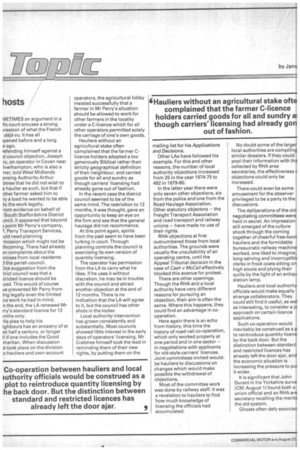hosts
Page 16

If you've noticed an error in this article please click here to report it so we can fix it.
V1ETIN1ES an argument in a tic court arouses a strong iression of what the French dela vu. It has all ipened before and a long e ago.
lefending himself against a 3i council objection, Joseph ry, an operator in Coven near Iverhampton, who is also a -ner, told West Midlands 3nsing Authority Arthur btree that he did not wish to a haulier as such, but that if )ther farmer asked him to ry a load he wanted to be able Jo the work legally.
'rem evidence on behalf of South Staffordshire District Jncil, it appeared that beyond 3 point Mr Perry's company, '. Perry Transport Services, uld need planning -mission which might not be thcoming. There had already 3n complaints about the imises from local residents
I the parish council.
)ne suggestion from the trict council was that a ;tricted licence should be ued. This would of course ve prevented Mr Perry from ing legally even the limited :ra work he had in mind.
n the end, the LA renewed Mr rry's standard licence for 12 )riths only.
-us plea to help his ighbours has an ancestry of at ist half a century, or longer II if one includes the Good maritan. When discussion 3t took place on the division o hauliers and own-account operators, the agricultural lobby insisted successfully that a farmer in Mr Perry's situation should be allowed to work for other farmers in the locality under a C-licence which for all other operators permitted solely the carriage of one's own goods.
Hauliers without an agricultural stake often complained that the farmer Clicence holders adopted a too generously Biblical rather than strictly geographical definition of their neighbour, and carried goods for all and sundry as though carriers' licensing had already gone out of fashion.
In the recent case the district council seemed to be of the same mind. The restriction to 12 months, it was thought, gave an opportunity to keep an eye on the firm and see that the general haulage did not recommence.
At this point again, spirits from the past seem to have been lurking in court. Through planning controls the council is exercising its own version of quantity licensing.
The operator has permission from the LA to carry what he likes. If he uses it without discretion, he may be in trouble with the council and attract another objection at the end of 12 months. There is no indication that the LA will agree to it, but the council has other shots in the locker.
Local authority intervention has grown consistently and substantially. Most councils showed little interest in the early days of operators' licensing. Mr Crabtree himself took the lead in reminding them of their new rights, by putting them on the mailing list for his Applications and Decisions.
Other LAs have followed his example. For this and other reasons, the number of local authority objections increased from 25 in the year 1974-75 to 492 in 1979-80.
In the latter year there were only seven other objections, six from the police and one from the Road Haulage Association. Other statutory objectors — the Freight Transport Association and road transport and railway unions — have made no use of their rights.
RHA objections at first outnumbered those from local authorities. The grounds were usually the unsuitability of an operating centre, until the Appeal Tribunal decision in the case of Cash v McCall effectively blocked this avenue for protest.
There are other openings. Though the RHA and a local authority have very different reasons for pursuing an objection, their aim is often the same. Where this happens, they could find an advantage in cooperation.
Here again there is an echo from history, this time the history of road-rail co-operation, which only worked properly at one period and in one sector — in negotiations with applicants for old-style carriers' licences. Joint committees invited wouldbe hauliers to discussions on changes which would make possible the withdrawal of objections.
Most of the committee work was done by railway staff. It was a revelation to hauliers to find how much knowledge of licensing the officials had accumulated. No doubt some of the larger local authorities are compiling similar dossiers. If they could pool their information with tha collected by RHA area secretaries, the effectiveness c objections could only be increased.
There could even be some amusement for the observer privileged to be a party to the discussions.
The deliberations of the old negotiating committees were held in secret. An impression still emerged of the culture shock through the coming together of cheerful free-boot hauliers and the formidable bureaucratic railway machine worked, one liked to imagine, long-serving and incorruptibl( clerks in frock coats sitting on high stools and plying their quills by the light of an antiqu station lamp.
Hauliers and local authority officials would make equally strange collaborators. They could still find it useful, as wel as interesting, to consider a jo approach on certain licence applications.
Such co-operation would inevitably be construed as a p to reintroduce quantity licensi by the back door. But the distinction between standard and restricted licences has already left the door ajar, and the economic situation is increasing the pressure to pm it wider.
It is significant that John Durant in his Yorkshire surve (CM, August 1)found both a union official and an RHA are secretary recalling the merits the old system.
Ghosts often defy exorcisn




























































